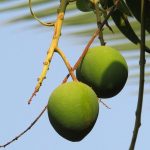The African mango, also known as Irvingia gabonensis, has gained prominence in recent years as a natural and effective weight loss aid. This fruit, native to West and Central Africa, has been used for centuries by traditional healers for its medicinal properties. Let's delve into the fascinating world of the African mango and explore its weight loss benefits.
**Fiber-Rich and Satiating**
The African mango is an excellent source of dietary fiber, which plays a crucial role in weight management. Fiber helps create a feeling of fullness by slowing down digestion and absorption of food. This reduces hunger cravings and promotes satiety, leading to decreased calorie intake.
**Appetite Suppressant**
Research suggests that the African mango contains compounds that act as appetite suppressants. These compounds interact with the hypothalamus, a brain region responsible for regulating appetite and metabolism. By suppressing appetite, the African mango can help individuals control their food intake and reduce overall calorie consumption.
**Lipid Metabolism Regulator**
The African mango has been found to have beneficial effects on lipid metabolism. Studies indicate that it may help lower levels of LDL (bad) cholesterol while increasing HDL (good) cholesterol. This improved lipid profile can reduce the risk of heart disease, which is often associated with obesity.
**Anti-inflammatory Properties**
Chronic inflammation has been linked to obesity and weight gain. The African mango possesses anti-inflammatory properties that may help reduce inflammation throughout the body. By combating inflammation, it can contribute to overall health and well-being, which can support weight loss efforts.
**How to Use African Mango for Weight Loss**
African mango supplements typically contain the seeds of the fruit, which are rich in the beneficial compounds. The recommended dosage varies depending on the individual and the specific supplement used. It is essential to follow the manufacturer's instructions and consult with a healthcare professional before using African mango supplements.
**Precautions**
While the African mango is generally considered safe, it is not recommended for everyone. Individuals with certain medical conditions, such as liver disease or kidney disease, should exercise caution. Pregnant or breastfeeding women should avoid taking African mango supplements.
**Conclusion**
The African mango is a promising natural remedy for weight loss. Its fiber-rich content, appetite-suppressing effects, lipid metabolism regulation, and anti-inflammatory properties contribute to its effectiveness as a weight loss aid. However, it is essential to use African mango supplements cautiously and under the guidance of a healthcare professional. By incorporating the African mango into a well-rounded weight loss plan that includes a healthy diet and regular exercise, individuals can harness its potential benefits and achieve their weight loss goals.

